The Life Course Approach: Aging, Theories, and Health Essay
VerifiedAdded on 2023/01/16
|6
|1359
|26
Essay
AI Summary
This essay provides a detailed overview of the life course approach, exploring the concepts of successful and usual aging. It defines successful aging as the absence of disease and the maintenance of cognitive and physical abilities, while usual aging is presented as the natural process of aging. The essay further discusses factors influencing successful aging, including lifestyle choices, genetics, and environmental factors. It highlights the importance of healthy habits such as diet, exercise, and social interaction. The essay also presents and analyzes key theories such as the disengagement theory and activity theory, offering historical and cross-cultural perspectives on aging. Furthermore, it examines different models like the bio-psychosocial and biomedical approaches, emphasizing the importance of physical activity and psychological well-being. The conclusion summarizes the main points, reiterating the distinctions between successful and usual aging and emphasizing the need for proactive health measures.
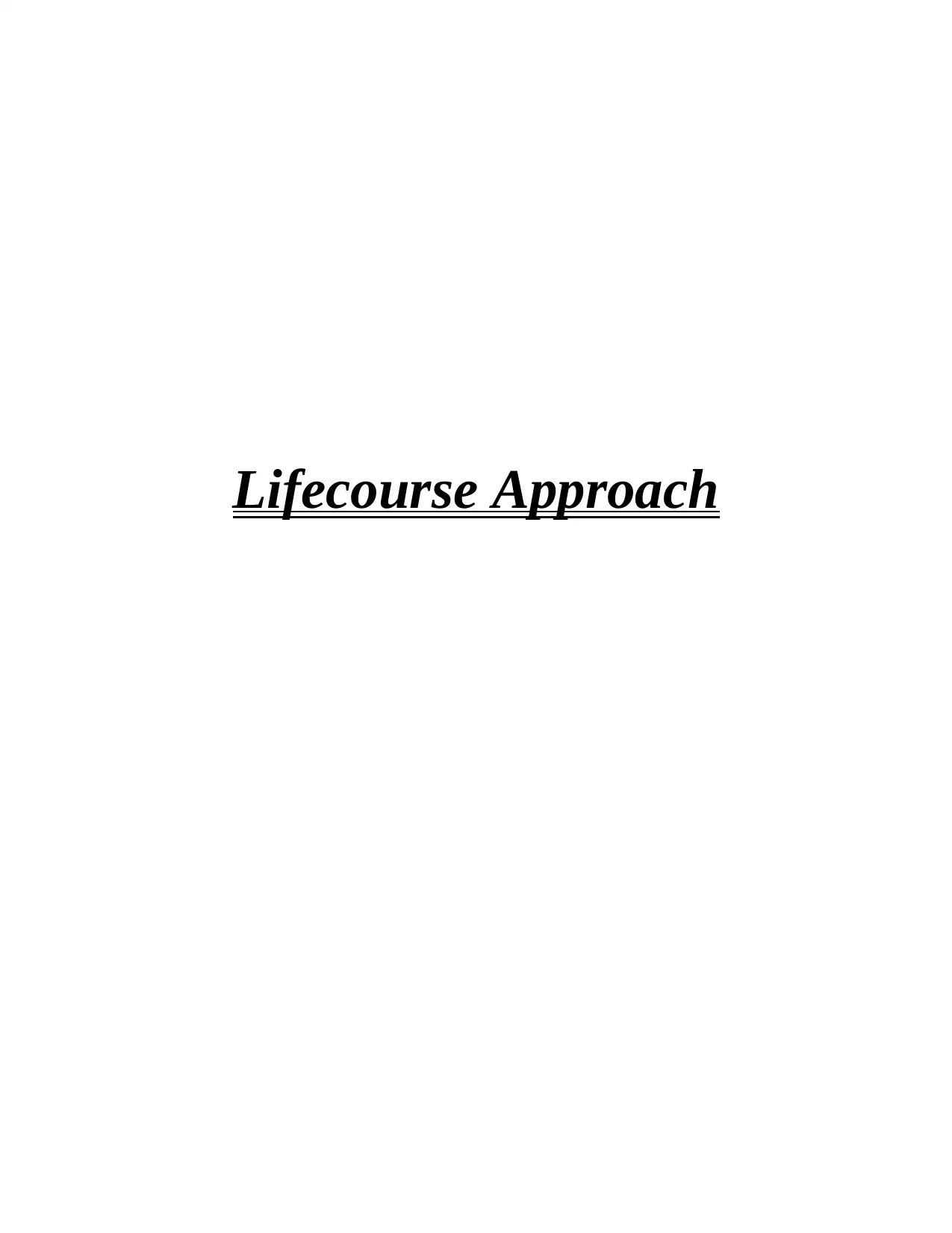
Lifecourse Approach
Paraphrase This Document
Need a fresh take? Get an instant paraphrase of this document with our AI Paraphraser
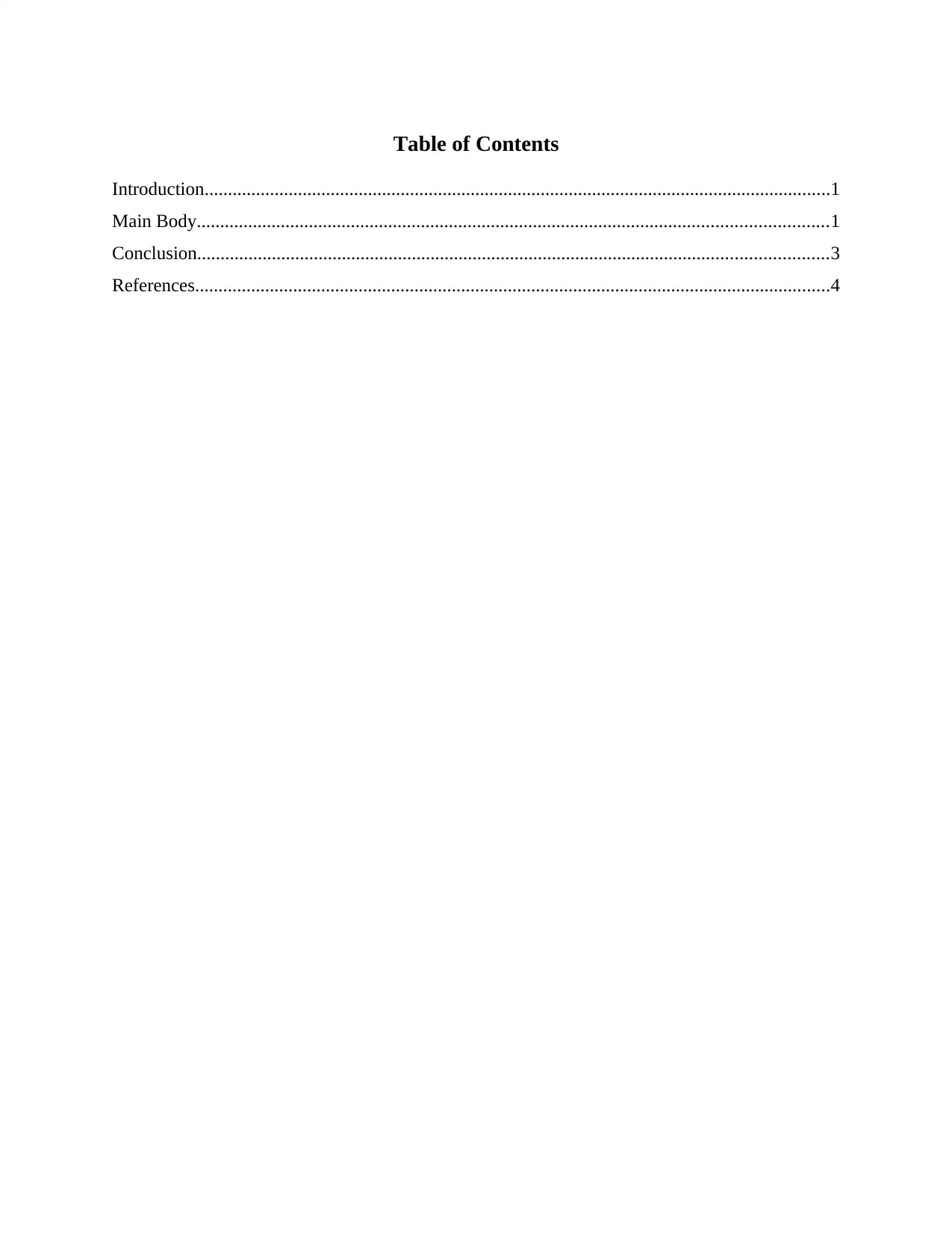
Table of Contents
Introduction......................................................................................................................................1
Main Body.......................................................................................................................................1
Conclusion.......................................................................................................................................3
References........................................................................................................................................4
Introduction......................................................................................................................................1
Main Body.......................................................................................................................................1
Conclusion.......................................................................................................................................3
References........................................................................................................................................4
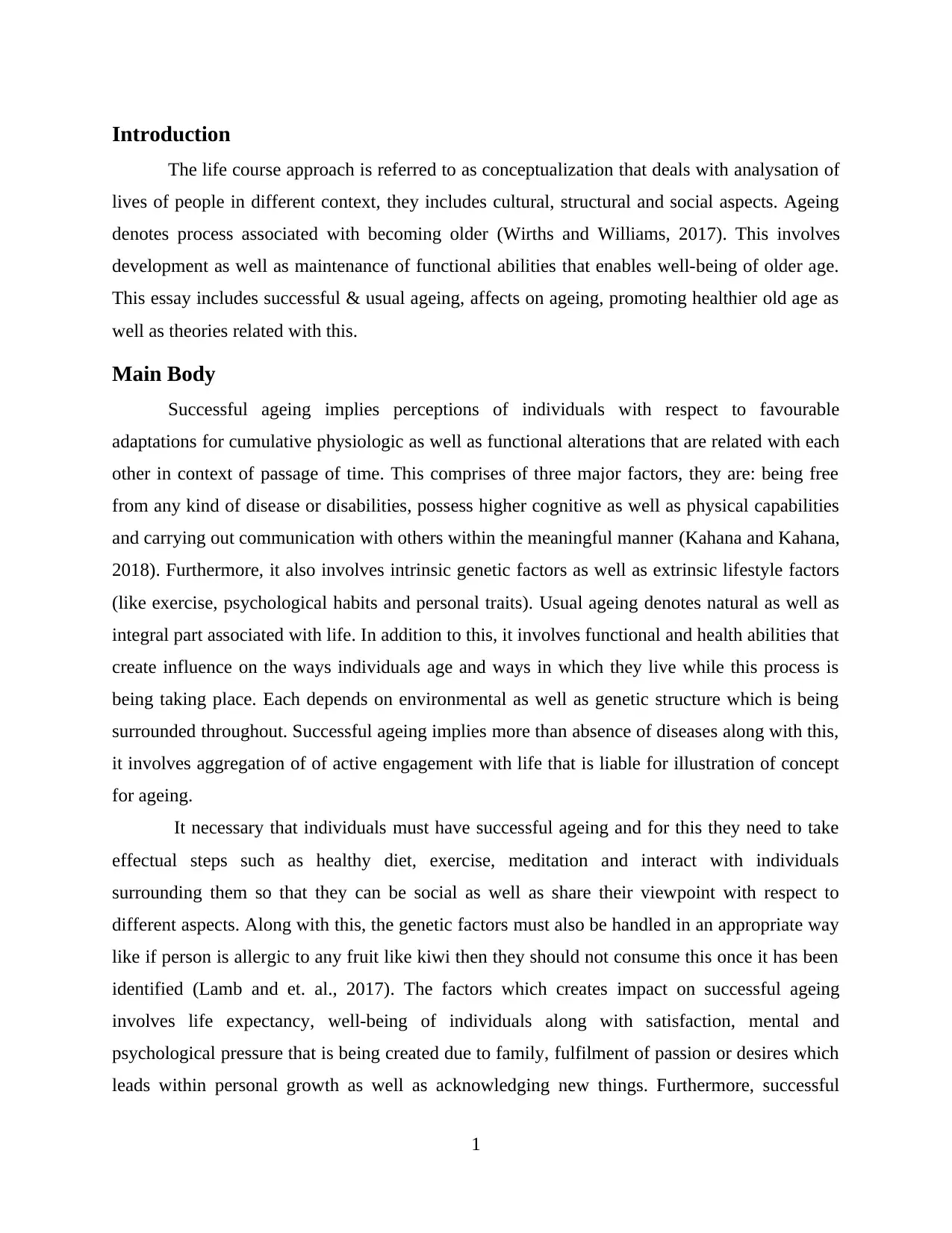
Introduction
The life course approach is referred to as conceptualization that deals with analysation of
lives of people in different context, they includes cultural, structural and social aspects. Ageing
denotes process associated with becoming older (Wirths and Williams, 2017). This involves
development as well as maintenance of functional abilities that enables well-being of older age.
This essay includes successful & usual ageing, affects on ageing, promoting healthier old age as
well as theories related with this.
Main Body
Successful ageing implies perceptions of individuals with respect to favourable
adaptations for cumulative physiologic as well as functional alterations that are related with each
other in context of passage of time. This comprises of three major factors, they are: being free
from any kind of disease or disabilities, possess higher cognitive as well as physical capabilities
and carrying out communication with others within the meaningful manner (Kahana and Kahana,
2018). Furthermore, it also involves intrinsic genetic factors as well as extrinsic lifestyle factors
(like exercise, psychological habits and personal traits). Usual ageing denotes natural as well as
integral part associated with life. In addition to this, it involves functional and health abilities that
create influence on the ways individuals age and ways in which they live while this process is
being taking place. Each depends on environmental as well as genetic structure which is being
surrounded throughout. Successful ageing implies more than absence of diseases along with this,
it involves aggregation of of active engagement with life that is liable for illustration of concept
for ageing.
It necessary that individuals must have successful ageing and for this they need to take
effectual steps such as healthy diet, exercise, meditation and interact with individuals
surrounding them so that they can be social as well as share their viewpoint with respect to
different aspects. Along with this, the genetic factors must also be handled in an appropriate way
like if person is allergic to any fruit like kiwi then they should not consume this once it has been
identified (Lamb and et. al., 2017). The factors which creates impact on successful ageing
involves life expectancy, well-being of individuals along with satisfaction, mental and
psychological pressure that is being created due to family, fulfilment of passion or desires which
leads within personal growth as well as acknowledging new things. Furthermore, successful
1
The life course approach is referred to as conceptualization that deals with analysation of
lives of people in different context, they includes cultural, structural and social aspects. Ageing
denotes process associated with becoming older (Wirths and Williams, 2017). This involves
development as well as maintenance of functional abilities that enables well-being of older age.
This essay includes successful & usual ageing, affects on ageing, promoting healthier old age as
well as theories related with this.
Main Body
Successful ageing implies perceptions of individuals with respect to favourable
adaptations for cumulative physiologic as well as functional alterations that are related with each
other in context of passage of time. This comprises of three major factors, they are: being free
from any kind of disease or disabilities, possess higher cognitive as well as physical capabilities
and carrying out communication with others within the meaningful manner (Kahana and Kahana,
2018). Furthermore, it also involves intrinsic genetic factors as well as extrinsic lifestyle factors
(like exercise, psychological habits and personal traits). Usual ageing denotes natural as well as
integral part associated with life. In addition to this, it involves functional and health abilities that
create influence on the ways individuals age and ways in which they live while this process is
being taking place. Each depends on environmental as well as genetic structure which is being
surrounded throughout. Successful ageing implies more than absence of diseases along with this,
it involves aggregation of of active engagement with life that is liable for illustration of concept
for ageing.
It necessary that individuals must have successful ageing and for this they need to take
effectual steps such as healthy diet, exercise, meditation and interact with individuals
surrounding them so that they can be social as well as share their viewpoint with respect to
different aspects. Along with this, the genetic factors must also be handled in an appropriate way
like if person is allergic to any fruit like kiwi then they should not consume this once it has been
identified (Lamb and et. al., 2017). The factors which creates impact on successful ageing
involves life expectancy, well-being of individuals along with satisfaction, mental and
psychological pressure that is being created due to family, fulfilment of passion or desires which
leads within personal growth as well as acknowledging new things. Furthermore, successful
1
⊘ This is a preview!⊘
Do you want full access?
Subscribe today to unlock all pages.

Trusted by 1+ million students worldwide
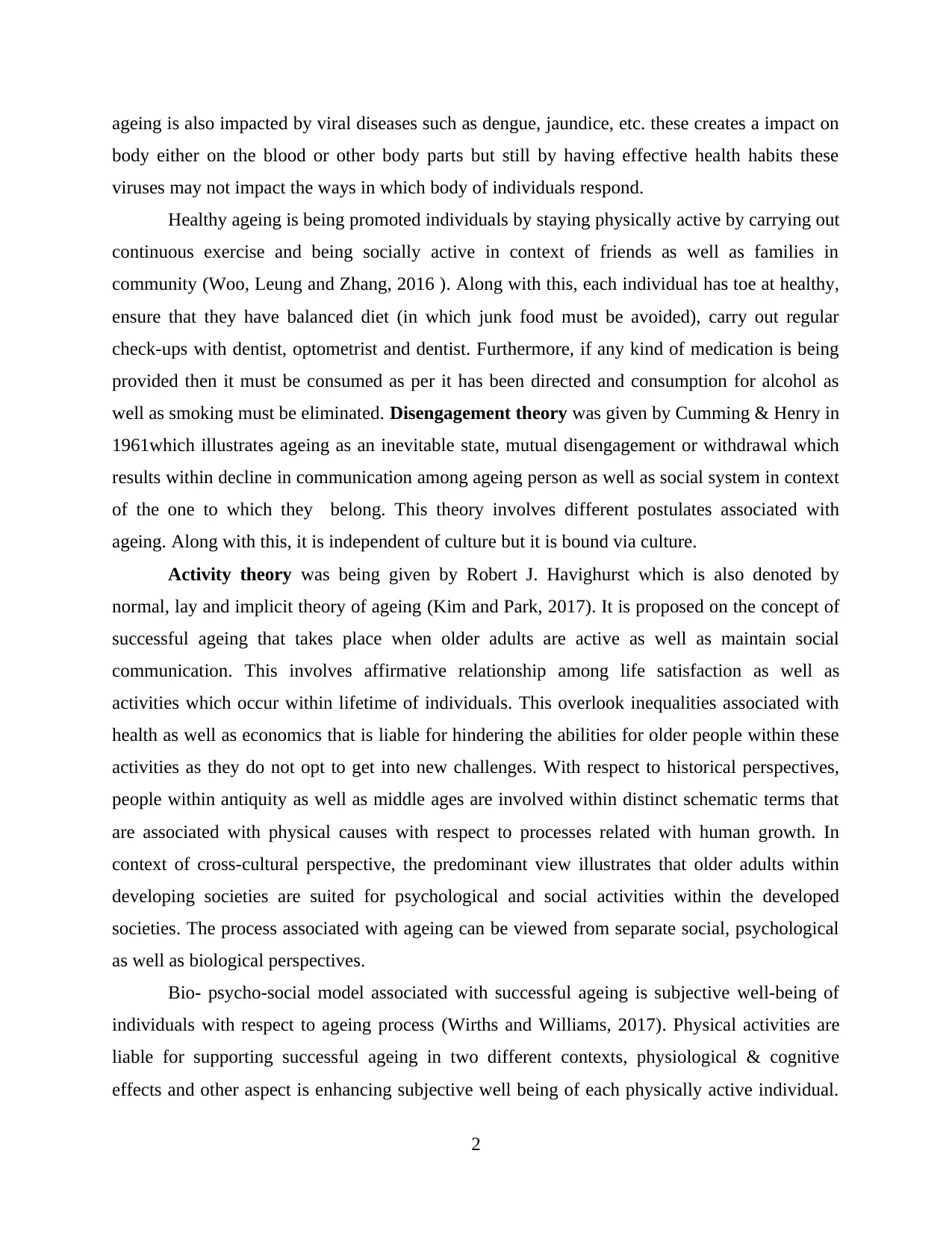
ageing is also impacted by viral diseases such as dengue, jaundice, etc. these creates a impact on
body either on the blood or other body parts but still by having effective health habits these
viruses may not impact the ways in which body of individuals respond.
Healthy ageing is being promoted individuals by staying physically active by carrying out
continuous exercise and being socially active in context of friends as well as families in
community (Woo, Leung and Zhang, 2016 ). Along with this, each individual has toe at healthy,
ensure that they have balanced diet (in which junk food must be avoided), carry out regular
check-ups with dentist, optometrist and dentist. Furthermore, if any kind of medication is being
provided then it must be consumed as per it has been directed and consumption for alcohol as
well as smoking must be eliminated. Disengagement theory was given by Cumming & Henry in
1961which illustrates ageing as an inevitable state, mutual disengagement or withdrawal which
results within decline in communication among ageing person as well as social system in context
of the one to which they belong. This theory involves different postulates associated with
ageing. Along with this, it is independent of culture but it is bound via culture.
Activity theory was being given by Robert J. Havighurst which is also denoted by
normal, lay and implicit theory of ageing (Kim and Park, 2017). It is proposed on the concept of
successful ageing that takes place when older adults are active as well as maintain social
communication. This involves affirmative relationship among life satisfaction as well as
activities which occur within lifetime of individuals. This overlook inequalities associated with
health as well as economics that is liable for hindering the abilities for older people within these
activities as they do not opt to get into new challenges. With respect to historical perspectives,
people within antiquity as well as middle ages are involved within distinct schematic terms that
are associated with physical causes with respect to processes related with human growth. In
context of cross-cultural perspective, the predominant view illustrates that older adults within
developing societies are suited for psychological and social activities within the developed
societies. The process associated with ageing can be viewed from separate social, psychological
as well as biological perspectives.
Bio- psycho-social model associated with successful ageing is subjective well-being of
individuals with respect to ageing process (Wirths and Williams, 2017). Physical activities are
liable for supporting successful ageing in two different contexts, physiological & cognitive
effects and other aspect is enhancing subjective well being of each physically active individual.
2
body either on the blood or other body parts but still by having effective health habits these
viruses may not impact the ways in which body of individuals respond.
Healthy ageing is being promoted individuals by staying physically active by carrying out
continuous exercise and being socially active in context of friends as well as families in
community (Woo, Leung and Zhang, 2016 ). Along with this, each individual has toe at healthy,
ensure that they have balanced diet (in which junk food must be avoided), carry out regular
check-ups with dentist, optometrist and dentist. Furthermore, if any kind of medication is being
provided then it must be consumed as per it has been directed and consumption for alcohol as
well as smoking must be eliminated. Disengagement theory was given by Cumming & Henry in
1961which illustrates ageing as an inevitable state, mutual disengagement or withdrawal which
results within decline in communication among ageing person as well as social system in context
of the one to which they belong. This theory involves different postulates associated with
ageing. Along with this, it is independent of culture but it is bound via culture.
Activity theory was being given by Robert J. Havighurst which is also denoted by
normal, lay and implicit theory of ageing (Kim and Park, 2017). It is proposed on the concept of
successful ageing that takes place when older adults are active as well as maintain social
communication. This involves affirmative relationship among life satisfaction as well as
activities which occur within lifetime of individuals. This overlook inequalities associated with
health as well as economics that is liable for hindering the abilities for older people within these
activities as they do not opt to get into new challenges. With respect to historical perspectives,
people within antiquity as well as middle ages are involved within distinct schematic terms that
are associated with physical causes with respect to processes related with human growth. In
context of cross-cultural perspective, the predominant view illustrates that older adults within
developing societies are suited for psychological and social activities within the developed
societies. The process associated with ageing can be viewed from separate social, psychological
as well as biological perspectives.
Bio- psycho-social model associated with successful ageing is subjective well-being of
individuals with respect to ageing process (Wirths and Williams, 2017). Physical activities are
liable for supporting successful ageing in two different contexts, physiological & cognitive
effects and other aspect is enhancing subjective well being of each physically active individual.
2
Paraphrase This Document
Need a fresh take? Get an instant paraphrase of this document with our AI Paraphraser
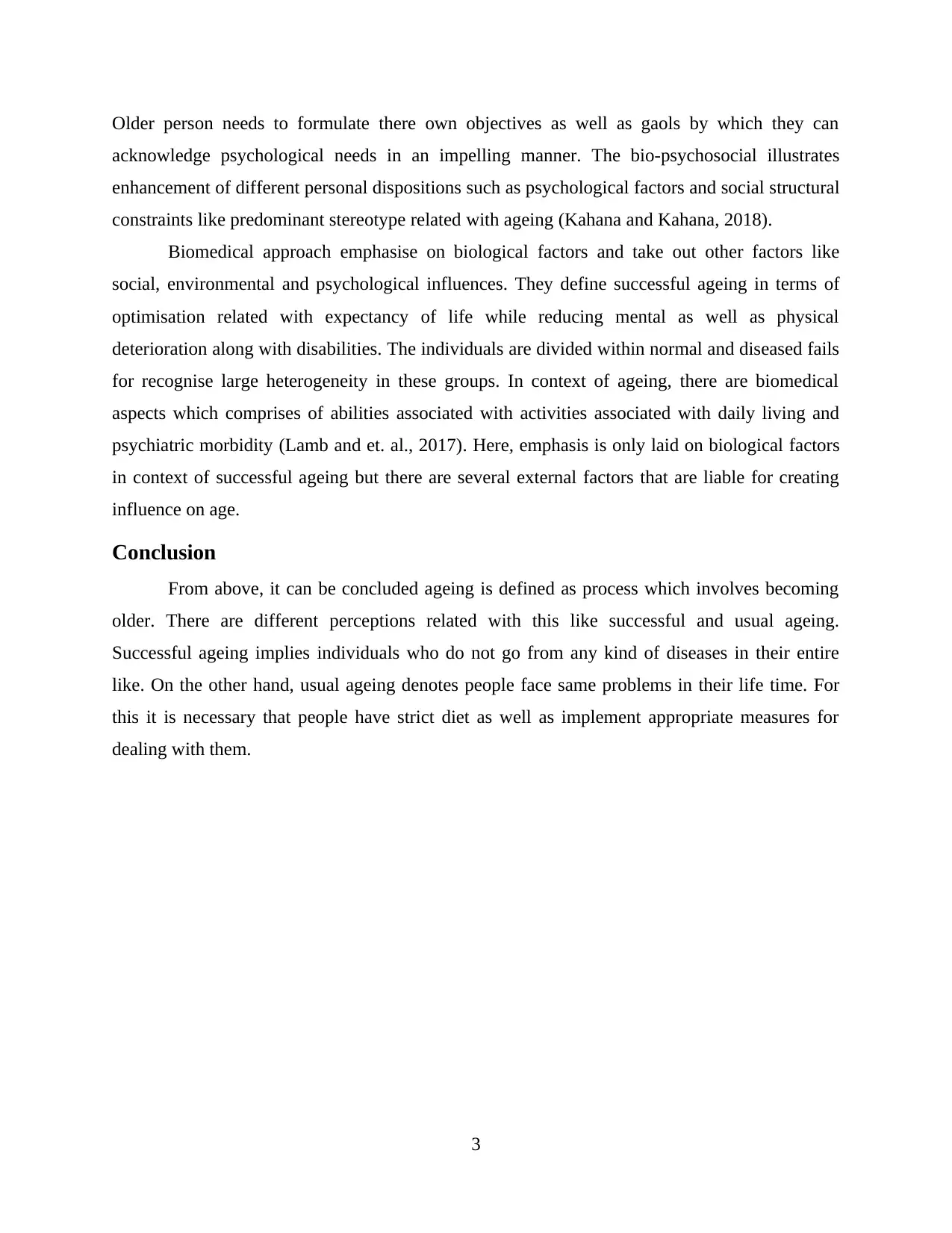
Older person needs to formulate there own objectives as well as gaols by which they can
acknowledge psychological needs in an impelling manner. The bio-psychosocial illustrates
enhancement of different personal dispositions such as psychological factors and social structural
constraints like predominant stereotype related with ageing (Kahana and Kahana, 2018).
Biomedical approach emphasise on biological factors and take out other factors like
social, environmental and psychological influences. They define successful ageing in terms of
optimisation related with expectancy of life while reducing mental as well as physical
deterioration along with disabilities. The individuals are divided within normal and diseased fails
for recognise large heterogeneity in these groups. In context of ageing, there are biomedical
aspects which comprises of abilities associated with activities associated with daily living and
psychiatric morbidity (Lamb and et. al., 2017). Here, emphasis is only laid on biological factors
in context of successful ageing but there are several external factors that are liable for creating
influence on age.
Conclusion
From above, it can be concluded ageing is defined as process which involves becoming
older. There are different perceptions related with this like successful and usual ageing.
Successful ageing implies individuals who do not go from any kind of diseases in their entire
like. On the other hand, usual ageing denotes people face same problems in their life time. For
this it is necessary that people have strict diet as well as implement appropriate measures for
dealing with them.
3
acknowledge psychological needs in an impelling manner. The bio-psychosocial illustrates
enhancement of different personal dispositions such as psychological factors and social structural
constraints like predominant stereotype related with ageing (Kahana and Kahana, 2018).
Biomedical approach emphasise on biological factors and take out other factors like
social, environmental and psychological influences. They define successful ageing in terms of
optimisation related with expectancy of life while reducing mental as well as physical
deterioration along with disabilities. The individuals are divided within normal and diseased fails
for recognise large heterogeneity in these groups. In context of ageing, there are biomedical
aspects which comprises of abilities associated with activities associated with daily living and
psychiatric morbidity (Lamb and et. al., 2017). Here, emphasis is only laid on biological factors
in context of successful ageing but there are several external factors that are liable for creating
influence on age.
Conclusion
From above, it can be concluded ageing is defined as process which involves becoming
older. There are different perceptions related with this like successful and usual ageing.
Successful ageing implies individuals who do not go from any kind of diseases in their entire
like. On the other hand, usual ageing denotes people face same problems in their life time. For
this it is necessary that people have strict diet as well as implement appropriate measures for
dealing with them.
3
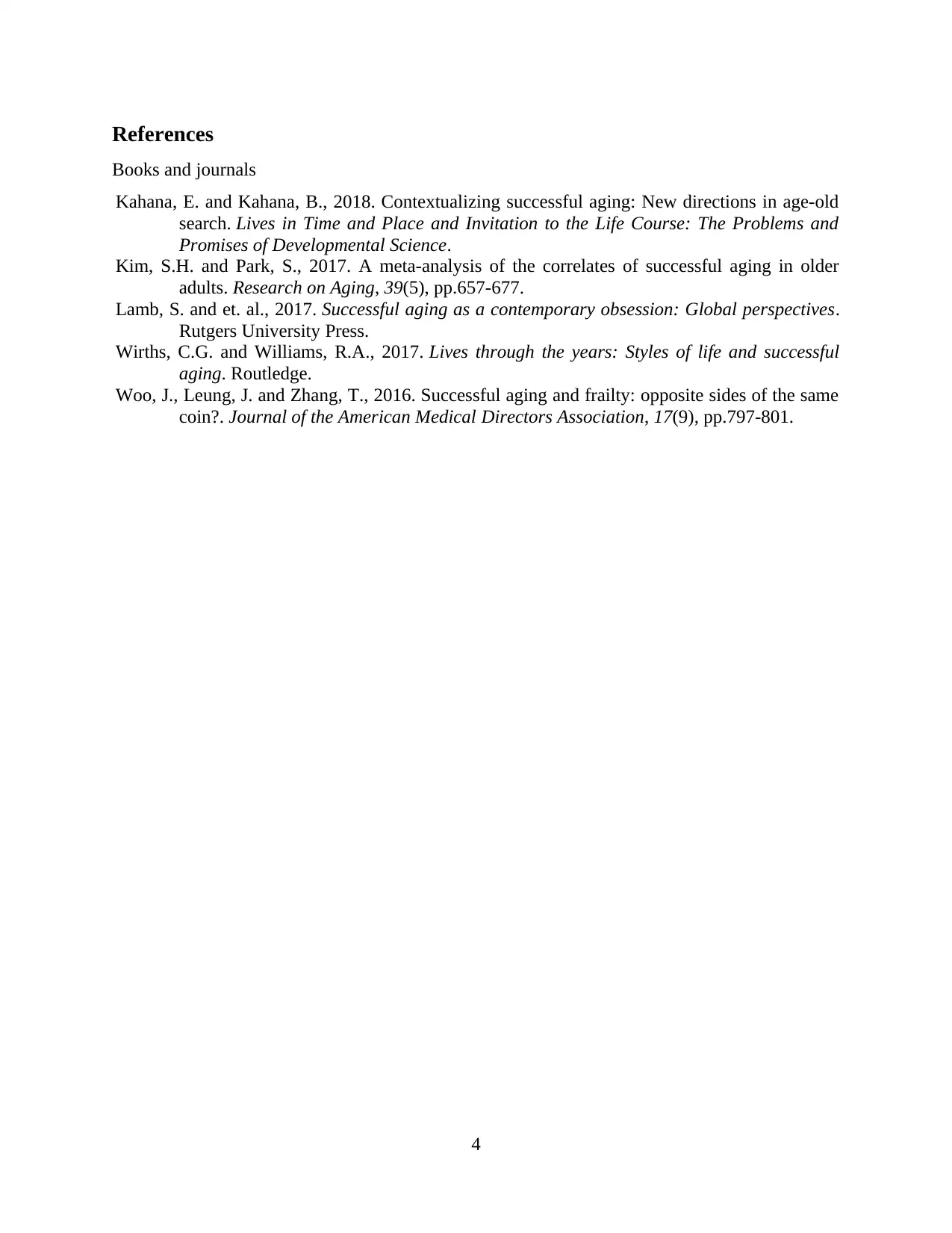
References
Books and journals
Kahana, E. and Kahana, B., 2018. Contextualizing successful aging: New directions in age-old
search. Lives in Time and Place and Invitation to the Life Course: The Problems and
Promises of Developmental Science.
Kim, S.H. and Park, S., 2017. A meta-analysis of the correlates of successful aging in older
adults. Research on Aging, 39(5), pp.657-677.
Lamb, S. and et. al., 2017. Successful aging as a contemporary obsession: Global perspectives.
Rutgers University Press.
Wirths, C.G. and Williams, R.A., 2017. Lives through the years: Styles of life and successful
aging. Routledge.
Woo, J., Leung, J. and Zhang, T., 2016. Successful aging and frailty: opposite sides of the same
coin?. Journal of the American Medical Directors Association, 17(9), pp.797-801.
4
Books and journals
Kahana, E. and Kahana, B., 2018. Contextualizing successful aging: New directions in age-old
search. Lives in Time and Place and Invitation to the Life Course: The Problems and
Promises of Developmental Science.
Kim, S.H. and Park, S., 2017. A meta-analysis of the correlates of successful aging in older
adults. Research on Aging, 39(5), pp.657-677.
Lamb, S. and et. al., 2017. Successful aging as a contemporary obsession: Global perspectives.
Rutgers University Press.
Wirths, C.G. and Williams, R.A., 2017. Lives through the years: Styles of life and successful
aging. Routledge.
Woo, J., Leung, J. and Zhang, T., 2016. Successful aging and frailty: opposite sides of the same
coin?. Journal of the American Medical Directors Association, 17(9), pp.797-801.
4
⊘ This is a preview!⊘
Do you want full access?
Subscribe today to unlock all pages.

Trusted by 1+ million students worldwide
1 out of 6
Related Documents
Your All-in-One AI-Powered Toolkit for Academic Success.
+13062052269
info@desklib.com
Available 24*7 on WhatsApp / Email
![[object Object]](/_next/static/media/star-bottom.7253800d.svg)
Unlock your academic potential
Copyright © 2020–2026 A2Z Services. All Rights Reserved. Developed and managed by ZUCOL.




